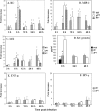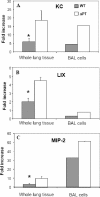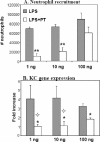Pertussis toxin inhibits early chemokine production to delay neutrophil recruitment in response to Bordetella pertussis respiratory tract infection in mice
- PMID: 18765723
- PMCID: PMC2573337
- DOI: 10.1128/IAI.00895-08
Pertussis toxin inhibits early chemokine production to delay neutrophil recruitment in response to Bordetella pertussis respiratory tract infection in mice
Abstract
Pertussis is an acute respiratory disease of humans caused by the bacterium Bordetella pertussis. Pertussis toxin (PT) plays a major role in the virulence of this pathogen, including important effects that it has soon after inoculation. Studies in our laboratory and other laboratories have indicated that PT inhibits early neutrophil influx to the lungs and airways in response to B. pertussis respiratory tract infection in mice. Previous in vitro and in vivo studies have shown that PT can affect neutrophils directly by ADP ribosylating G(i) proteins associated with surface chemokine receptors, thereby inhibiting neutrophil migration in response to chemokines. However, in this study, by comparing responses to wild-type (WT) and PT-deficient strains, we found that PT has an indirect inhibitory effect on neutrophil recruitment to the airways in response to infection. Analysis of lung chemokine expression indicated that PT suppresses early neutrophil recruitment by inhibiting chemokine upregulation in alveolar macrophages and other lung cells in response to B. pertussis infection. Enhancement of early neutrophil recruitment to the airways in response to WT infection by addition of exogenous keratinocyte-derived chemokine, one of the dominant neutrophil-attracting chemokines in mice, further revealed an indirect effect of PT on neutrophil chemotaxis. Additionally, we showed that intranasal administration of PT inhibits lipopolysaccharide-induced chemokine gene expression and neutrophil recruitment to the airways, presumably by modulation of signaling through Toll-like receptor 4. Collectively, these results demonstrate how PT inhibits early inflammatory responses in the respiratory tract, which reduces neutrophil influx in response to B. pertussis infection, potentially providing an advantage to the pathogen in this interaction.
Figures







References
-
- Ausiello, C. M., F. Urbani, A. La Sala, R. Lande, A. Piscitelli, and A. Cassone. 1997. Acellular vaccines induce cell-mediated immunity to Bordetella pertussis antigens in infants undergoing primary vaccination against pertussis. Dev. Biol. Stand. 89315-320. - PubMed
-
- Barnard, A., B. P. Mahon, J. Watkins, K. Redhead, and K. H. Mills. 1996. Th1/Th2 cell dichotomy in acquired immunity to Bordetella pertussis: variables in the in vivo priming and in vitro cytokine detection techniques affect the classification of T-cell subsets as Th1, Th2 or Th0. Immunology 87372-380. - PMC - PubMed
-
- Carbonetti, N. H. 2007. Immunomodulation in the pathogenesis of Bordetella pertussis infection and disease. Curr. Opin. Pharmacol. 7272-278. - PubMed
Publication types
MeSH terms
Substances
Grants and funding
LinkOut - more resources
Full Text Sources
Medical

